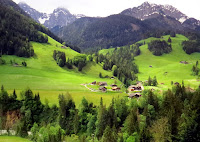Europe is best for the culture, history, architecture and food. It is a feast for the senses. The variety within the continent is mind boggling as expected, but don't rule out the variations within a country. Spain, for example, can be easily divided into several distinct cultures. Having traveled extensively around the US, I can say that Americans need not travel to Europe for untouched wilderness because there isn't much of it. Note, I didn't make it to Iceland and Norway. Natural beauty abounds, but not wilderness. Also, depending on the length of the trip, throw in some countryside in your itinerary. Guide books, (I used Lonely Planet), are biased towards cities. Obviously they give the maximum bang for your buck if you have only a few days. But after a week or two, I found cities tedious and overwhelming and had to decamp to the country to recharge.
Transport
Getting around Europe is fairly easy. I didn't rent a car anywhere mainly because of the cost, the hassle of figuring out parking rules and not understanding the language in most countries. Public transport in cities is exceptional and the inter city train connections range from superb in the west to non existent in the east. Though conversely, it's expensive in the west and cheap in the east. Train journeys are generally scenic, but I wouldn't use it as a way to see the country. In the sense, they are good to get from point A to B or to socialize. But it's hard to appreciate a place when you are whizzing by at high speeds, sometimes in excess of 300 kmph. Even Switzerland, with it's legendary train routes, is best seen by walking the trails and soaking in the scenery.
Eurail pass is handy, but may not be worth it. I'll examine the pros and cons. First, it's expensive. I had to save about $60 on average on every train ride, assuming that I'd use all 17 trips over two months, to break even. Train rides usually don't cost that much, except high speed trains which generally serve only major cities in western Europe. Besides, the high speed trains often incurred an added $12 fee for reservations. Further, overnight trains might cost more for these 'reservations'.
Second, a rail pass could be considered as a flexible travel option, meaning you don't need prior reservations. Depends. Some trains require reservations before boarding even with a rail pass. And even if they don't require reservations, I'd recommend you do it anyways. Else you might get bumped around during the journey by people who have reserved the seat you are on. Furthermore, I couldn't make these reservations online as Eurail said that they could only mail tickets to my address in Calif. I have no idea why they don't have e-tickets. Thus for every reservation, I had to trek to the nearest train station. And if you go to a station, you can only book tickets for journeys originating in that country. For example. if you are in Spain, you can't book a ticket for a journey in France. So much for flexibility.
Third, be careful about using the Eurail website/app for checking train connections. Trains not covered by the pass may not be listed. For example, there is a train from Ljubljana to Budapest. But it didn't show up when I was looking at options on the app. Lastly, in Central Europe, trains may not be your best option, rendering your pass quite useless. Overall, the verdict on the pass is, it depends. You can make your decision based on my feedback and information from a thousand other travel blogs and websites.
Stereotypes
We may have heard the joke on European stereotypes concerning heaven and hell.
Heaven Is Where:
The French are the chefs,
The Italians are the lovers
The British are the police
The Germans are the mechanics
And the Swiss make everything run on time
Hell is Where:
The British are the chefs
The Swiss are the lovers
The French are the mechanics
The Italians make everything run on time
And the Germans are the police
I think I'd want Italian chefs. But not drivers. I had heard about bad drivers and haphazard parking in Italy. Completely true. Even the cops drive badly. But the food, ah Italian food, makes up from everything. On the other hand, British food lives up to its billing. That's why they took over half the world. The Germans are definitely disciplined and organized. And their language lives up to sounding like machine gun fire. The French fortunately or unfortunately didn't conform to their reputation of snobbery.
Not listed above is Spain. I had heard of the lazy stereotype because of their siestas. I don't think that's quite true because they do end up working the same hours as everyone else. It's just that then their evenings are taken by work, and so the socializing spills over in to the wee hours of the morning and we have a sleep deprived nation on our hands. And lastly, Ireland. I didn't make it out here, but I saw Irish pubs all over Europe. They are always around the corner, lest an Irish guy gets a little too sober.
Best of Europe
The best cities on my trip were Paris, Prague and Amsterdam. It's hard to say why exactly and it also depends on your interests. For me it was architecture, history, beer, cafes and overall ambiance. For countryside, it has to be Bavaria with it's rolling hills against the backdrop of the alps and quaint villages. The best country was Italy. It scores decently well on all the above categories, plus the food is excellent. Of course the objectivity of my judgement may have been affected by the weather, cost and company I had in those places.
And here is a map of my trip. Barcelona was the first stop and Paris the last. Black lines represent land journey, green air and blue water.

























